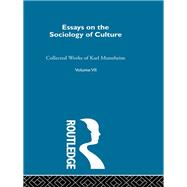| Introduction |
|
1 | (14) |
| PART ONE TOWARDS THE SOCIOLOGY OF THE MIND; AN INTRODUCTION |
|
|
First Approach to the Subject |
|
|
15 | (10) |
|
Hegel Reconsidered. From the Phenomenology to the Sociology of the Mind |
|
|
15 | (2) |
|
The Science of Society and the Sociology of the Mind. Difficulties of a Synthesis |
|
|
17 | (6) |
|
Tentative Nature of the Inquiry. Its Initial Objective: A Critique of the False Concepts of Society and Mind |
|
|
23 | (2) |
|
The False and the Proper Concepts of History and Society |
|
|
25 | (34) |
|
The Theory of an Immanent History of Thought, and Why it Emerged |
|
|
25 | (8) |
|
Digression on Art History |
|
|
32 | (1) |
|
False Polarization of the Attributes `Material' and `Ideal' |
|
|
33 | (3) |
|
The False Concepts of History, Dialectics, and Mediacy |
|
|
36 | (8) |
|
The Mediate Character of Roles. The Social Circulation of Perceptions and Complementary Situations |
|
|
44 | (7) |
|
Towards an Adequate Concept of Society |
|
|
51 | (2) |
|
A Preliminary Outline of the Steps towards the Sociology of the Mind |
|
|
53 | (2) |
|
The Three Types of Sociology and the Corresponding Levels of the Sociology of the Mind. Structure and Causality |
|
|
55 | (4) |
|
The Proper and Improper Concept of the Mind |
|
|
59 | (23) |
|
A Second Review of its Hegelian Version |
|
|
59 | (1) |
|
The Genesis of the Mind Concept |
|
|
60 | (4) |
|
The Subjective and Objective Manifestations of the Mind. The Social Genesis of Meaning |
|
|
64 | (4) |
|
The Suprapersonal Character of Meaning |
|
|
68 | (1) |
|
Critique of the Entelechy as a Conceptual Model |
|
|
69 | (2) |
|
The Explanatory and the Expository Procedure. The Structure of Events |
|
|
71 | (3) |
|
The Question whether the World Has Structure |
|
|
74 | (1) |
|
The Causal Account and the Expository Explanation Re-examined |
|
|
75 | (2) |
|
The Structural and the Random Concept of Causation. The Problem of Multiple Causation |
|
|
77 | (2) |
|
Historiography and the Structural View |
|
|
79 | (1) |
|
The Matrix of Works and of Action |
|
|
80 | (1) |
|
The Discovery of the Structural Relationship Between Action and Works |
|
|
81 | (1) |
|
An Outline of the Sociology of the Mind |
|
|
82 | (6) |
|
The Sociology of the Mind on the Axiomatic Level. The Ontology of the Social and its Bearing on the Historical Character of Thought |
|
|
83 | (3) |
|
The Sociology of the Mind on the Level of Comparative Typology |
|
|
86 | (1) |
|
The Sociology of the Mind on the Level of Historical Individuation |
|
|
87 | (1) |
|
Recapitutation: the Sociology of the Mind as an Area of Inquiry |
|
|
88 | (83) |
| PART TWO THE PROBLEM OF THE INTELLIGENTSIA. AN INQUIRY INTO ITS PAST AND PRESENT ROLE |
|
|
The Self-Discovery of Social Groups |
|
|
91 | (10) |
|
Outlines of a Sociological Theory of the Intelligentsia |
|
|
101 | (5) |
|
How Social Groups are Identified |
|
|
106 | (5) |
|
|
|
111 | (4) |
|
The Contemporary Intellectual |
|
|
115 | (6) |
|
The Historical Roles of the Intelligentsia |
|
|
121 | (38) |
|
The Social Background of Intellectuals |
|
|
|
The Affiliations of Intellectuals and Artists |
|
|
|
The Intelligentsia and the Classes |
|
|
|
The Social Habitat of Intellectuals |
|
|
|
The Natural History of the Intellectual |
|
|
159 | (7) |
|
The Contemporary Situation of the Intelligentsia |
|
|
166 | (5) |
| PART THREE THE DEMOCRATIZATION OF CULTURE |
|
|
Some Problems of Political Democracy at the Stage of its Full Development |
|
|
171 | (3) |
|
The Problem of Democratization as a General Cultural Phenomenon |
|
|
174 | (73) |
|
The Three Fundamental Principles of Democracy |
|
|
174 | (6) |
|
The Principle of the Ontological Equality of All Men |
|
|
180 | (8) |
|
The Autonomy of the Social Units |
|
|
188 | (12) |
|
Democratic Elites and their Mode of Selection |
|
|
200 | (39) |
|
Elite Selection and Democracy |
|
|
|
Group Structure and Relation to Other Groups |
|
|
|
The Self-Evaluation of Aristocratic and Democratic Elites |
|
|
|
Social Distance and the Democratization of Culture |
|
|
|
The Cultural Ideals of Aristocratic and Democratic Groups |
|
|
|
|
|
239 | (8) |
| Index |
|
247 | |

